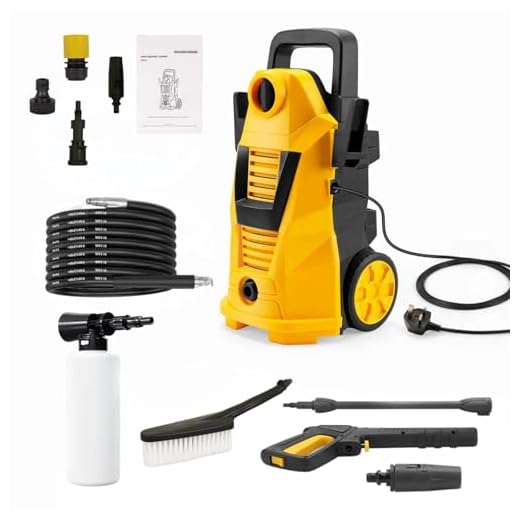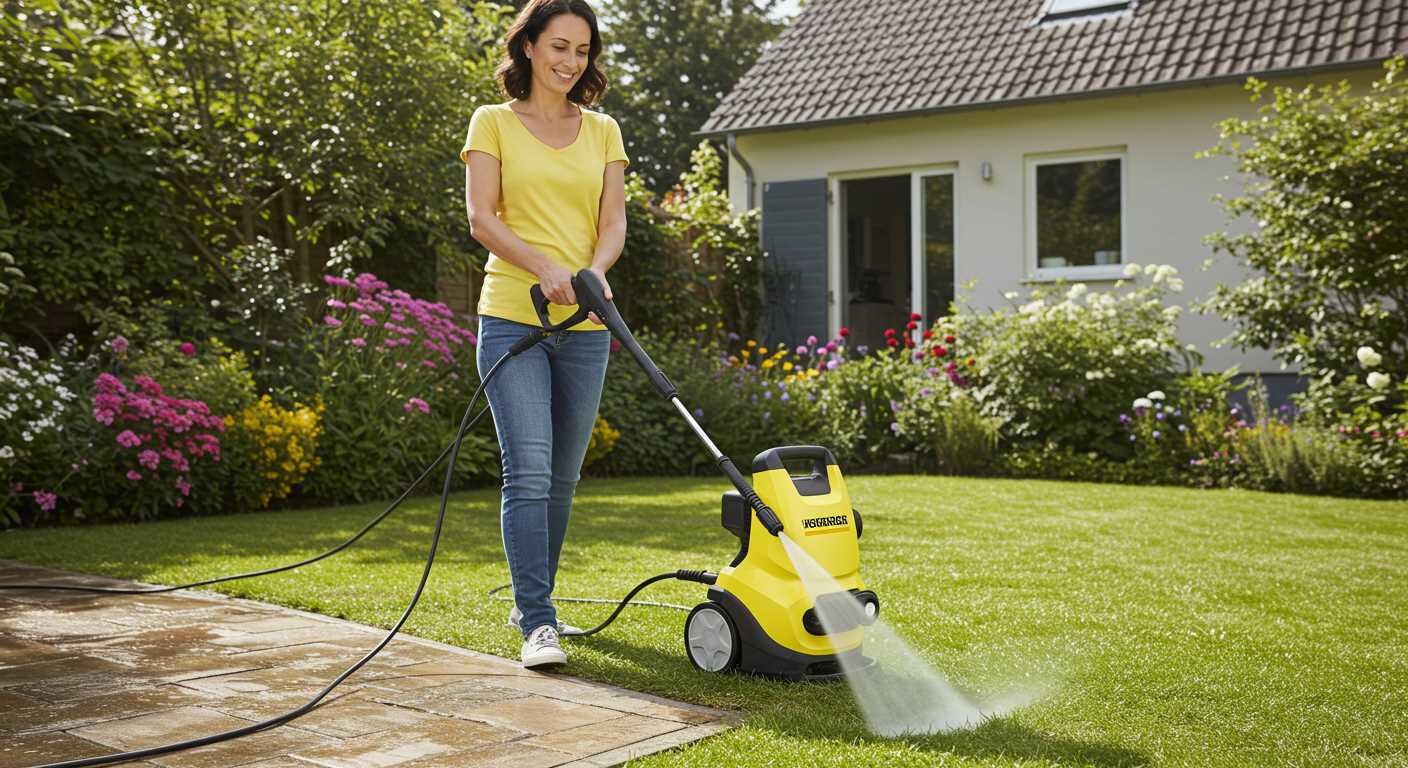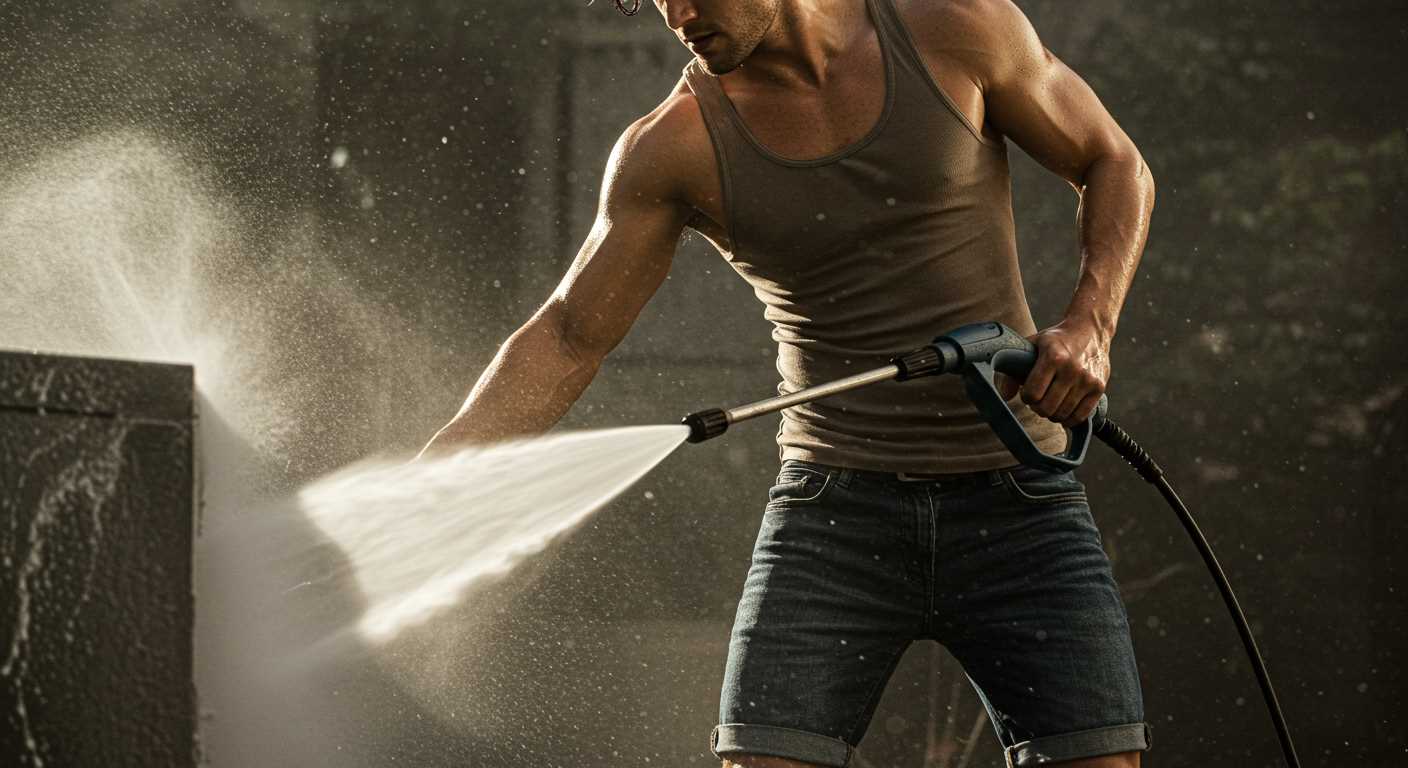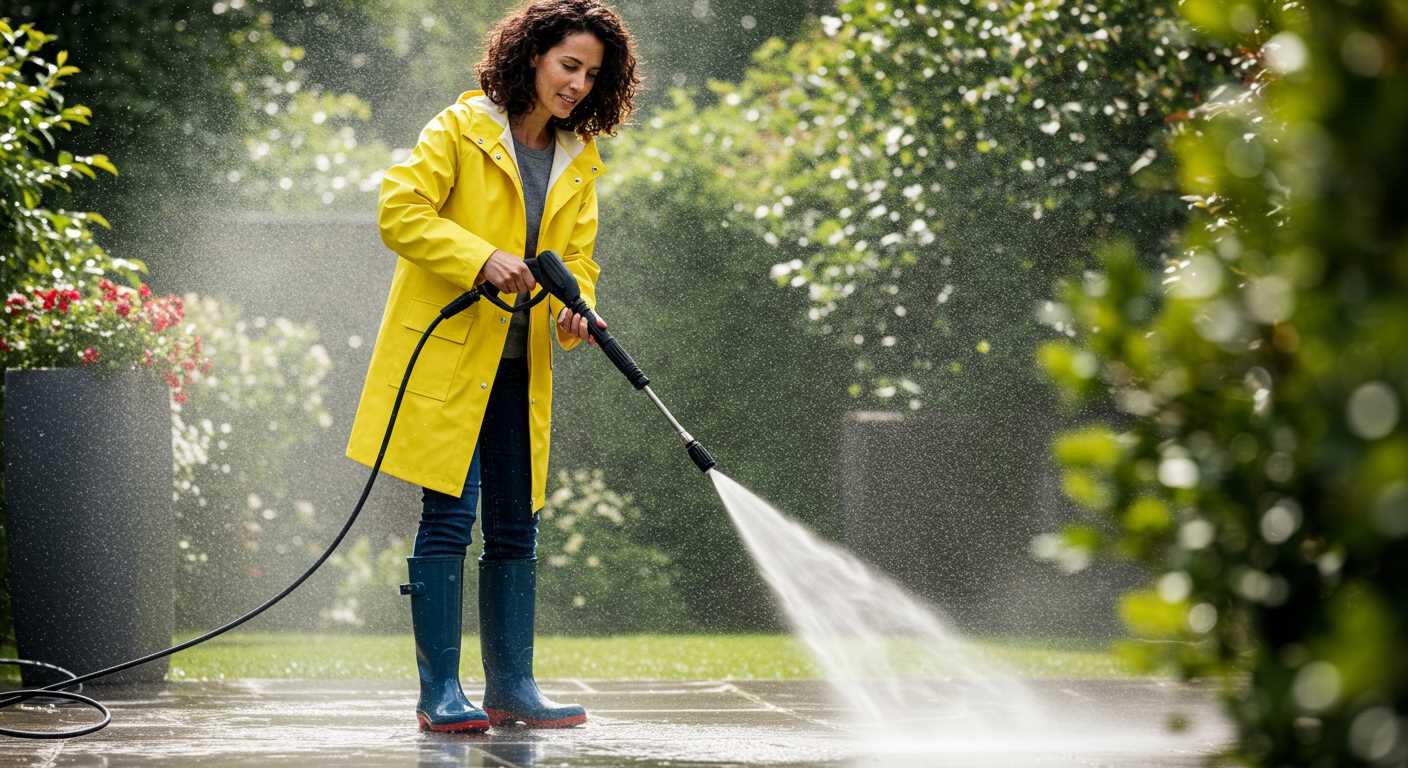



To achieve optimal results with your high-pressure cleaning unit, selecting a dedicated solution tailored for your specific tasks is paramount. For general use, I highly recommend a biodegradable option that’s tough on grime yet safe for the environment. Brands like Simple Green or Krud Kutter have crafted formulations that deliver excellent performance without compromising surface safety.
For those stubborn stains on concrete or brick, a solution containing sodium hypochlorite can work wonders. Look for products specifically designed for the task; they often provide clear instructions for dilution and application methods to maximise effectiveness. It’s important to avoid harsh chemicals or industrial-grade mixtures, as these can damage your equipment and surfaces over time.
When it comes to wooden surfaces, such as decks or fences, a gentle, penetrating cleaner like a wood brightener is essential. These solutions will clean while helping maintain the natural appearance of the wood. Always ensure you follow the dilution recommendations closely to protect your investment.
For automotive cleaning, a pH-balanced soap that cuts through grease without risking paint or metal integrity is the best choice. Brands such as Chemical Guys offer excellent options that have received positive feedback from users who prioritise their vehicle’s finish.
In summary, knowing the materials you are dealing with integrates seamlessly with the right cleaning agent ensures that every job yields the best results while prolonging the lifespan of your equipment.
Recommended Solutions for Optimal Cleaning
I recommend using a concentrated alkaline solution specifically designed for tough grime when tackling heavy-duty tasks. These types of formulations effectively cut through grease, oil, and other challenging substances.
For delicate surfaces such as painted wood or glass, opt for a biodegradable formula. These options ensure safety while still providing impressive results without risking damage to sensitive materials.
If the goal is to remove mould or mildew, consider a chlorine-based option. This choice not only eradicates these stubborn growths but also prevents their return on surfaces like patios and decks.
For vehicles, a pH-neutral soap is best. It’s safe on wax and ensures that your car’s finish remains protected while thoroughly cleaning without streaks.
Always check compatibility with your equipment before use. Some cleaning agents may be too harsh and can cause wear on components, ultimately leading to decreased performance. Make certain to adhere to manufacturer guidelines to prolong the lifespan of your machine.
Proper dilution of solutions is key. Following the recommended proportions ensures both efficiency and prevents unnecessary residue. A tank with an adjustable soap setting can be particularly useful in achieving the desired results.
Lastly, ensure you’re using the right nozzle for the type of solution applied. A wider spray pattern is often beneficial for soaps, while a more focused angle is preferable for stubborn stains.
Choosing the Right Cleaner for Different Surfaces

For an efficient clean, selecting the appropriate solution according to the surface type is pivotal. Each category of material has unique requirements, and some are more susceptible to damage than others.
Surface Types and Recommended Solutions
| Surface Type | Recommended Cleaner | Notes |
|---|---|---|
| Concrete | Alkaline-based | Excellent for oil stains and general grime. |
| Wood | Biodegradable | Prevents degradation and is eco-friendly. |
| Brick | Acidic solution | Helps remove efflorescence and robust stains. |
| Glass | Ammonia-based | Ensures streak-free shine without residue. |
| Painted Surfaces | Non-corrosive | Protects paint integrity while cleaning. |
Using the proper cleaner not only enhances efficiency but also safeguards surfaces from potential harm. I recommend always performing a spot test on a small, inconspicuous area before proceeding with the entire surface to ensure compatibility.
How to Identify the Best Degreaser for Tough Stains
Look for formulations specifically marked for grease removal. Effective options usually contain alkaline agents or solvents that break down heavy oils and residues. Prioritise products that list ingredients like sodium hydroxide or d-limonene, known for their grease-cutting capabilities.
Always check the dilution ratio. Concentrated formulas offering higher ratios tend to yield better results while being cost-effective. Ensure they’re compatible with your equipment and surfaces to prevent damage.
For severe grime, opt for biodegradable alternatives. They provide robust cleaning without harsh environmental impacts, which is a growing concern nowadays.
Conduct a patch test on an inconspicuous area to ascertain that there is no adverse reaction with the surface. This step is vital to avoid extensive damage or unwanted discolouration.
Evaluate user reviews and ratings. Past user experiences can provide insight into the ease of use and real-world effectiveness, helping to make a more informed choice.
Consider the application method. Gel-based degreasers provide cling, allowing them to work longer on vertical surfaces, enhancing their cleaning efficiency. Meanwhile, spray options are great for large areas and quick jobs.
Lastly, verify the pH level of the formula. Lower pH indicates a strong acidic nature, which may be suited for mineral deposits rather than grease. A balanced pH around 7-10 is typically ideal for tackling oily stains.
Comparing Eco-Friendly Options for Pressure Washers

My top recommendation for sustainable cleaning agents includes biodegradable solutions that effectively cut through grime without harming the environment. Look for brands that highlight their eco-friendly certifications, as these often guarantee lower toxicity levels and safer ingredients.
Key Ingredients to Consider

- Coconut-based surfactants: These natural foaming agents are excellent for dirt removal and are safe for surrounding flora and fauna.
- Citrus extracts: Known for their grease-cutting properties, these compounds effectively tackle stains while leaving a pleasant scent.
- Plant-derived enzymes: Powerful against organic materials, these enzymes can break down tough buildups without harsh chemicals.
Top Eco-Friendly Brands
- Simple Green Naturals: A well-respected choice with a formula that promotes low environmental impact while ensuring cleanliness.
- Bio-Kleen: Specialises in formulated products focusing on efficiency and sustainability, making it suitable for various applications.
- Eco-Green: This brand positions itself in the market by utilising plant-based ingredients, ensuring safe usage around pets and plants.
Always remember to check the dilution ratios and usage instructions to maximise performance while adhering to eco-friendly standards. With these considerations, you’ll ensure effective results without compromising environmental integrity.
Understanding Concentration Levels in Cleaning Solutions
For optimal results, I recommend using a concentrated solution, typically mixed at a ratio of 1:10 with water. This ensures effective removal of grime and stains without causing damage to surfaces. The concentration level significantly influences both performance and safety, making it vital to adhere to manufacturer guidelines.
Higher Concentration for Stubborn Stains
In cases of entrenched dirt or grease, a stronger formulation is advisable. Using a mix of 1:5 can enhance the cleaning power, but always test on a small, inconspicuous area first. This approach helps in determining the best mix without harming the surface.
Dilution Ratios for Specialized Needs
Different tasks might require specific dilution ratios. For instance, a light clean can often be achieved with a more diluted solution, around 1:20. Conversely, heavy-duty jobs may benefit from stronger mixes. Pay close attention to the type of grime you are tackling; this directly impacts the concentrate ratio you should choose.
Application Techniques for Maximum Cleaning Power
.jpg)
To guarantee optimal results during the washing process, I highly recommend employing the technique of overlapping strokes. This method ensures that every section receives adequate attention, preventing missed spots and inconsistencies in cleanliness. Begin at one corner and work your way across the surface, slightly overlapping each stroke as you proceed.
Adjust the nozzle to suit the task at hand–narrow nozzles are ideal for stubborn grime, while wider spray patterns are better for larger areas. For delicate surfaces like painted wood, a broader angle will help avoid potential damage while still achieving a thorough clean.
Mix the cleaner according to the manufacturer’s guidelines. An overly concentrated solution can lead to residue problems, while a diluted mix may not be strong enough. Establish a balance before application to maximise the efficacy of your cleaning agent.
Utilise pre-soaking whenever possible. This technique allows the formula to penetrate and break down stubborn stains before the water pressure is applied. Allow it to dwell on the surface for the recommended duration before rinsing to enhance performance.
When dealing with vertical surfaces, start from the bottom and work upwards. This prevents streaking, as runoff will not carry the dirt down to areas you’ve already cleaned. Rinse frequently to avoid the cleaner drying on the surface.
Finally, consider the ambient conditions. Windy or rainy weather can dilute the cleaner or carry it away, affecting efficiency. Choose a calm day to maximise impact, ensuring that the substance adheres effectively and delivers impressive results.
Safety Measures When Using Cleaning Solutions with Pressure Devices
Always wear appropriate personal protective equipment (PPE) such as gloves, goggles, and masks to safeguard against harmful chemicals and flying debris. It’s crucial to read and follow all labels carefully, ensuring to understand dilution ratios and necessary precautions.
Ensure your workspace is well-ventilated to reduce inhalation risks. Avoid using strong agents indoors or in enclosed spaces. When handling concentrated substances, dilute with water gradually, and never mix different chemicals as this can result in hazardous reactions.
Store all agents securely, away from children and pets. Dispose of any waste materials according to local regulations to prevent environmental harm.
Conduct a patch test on surface areas prior to full application to avoid damage. Always aim the water jet away from your body and those nearby. Maintain a safe distance when applying solutions, adjusting pressure levels as needed to prevent splatter.
Check equipment for leaks or damages before commencing work to ensure safe operation. After use, rinse all components thoroughly to remove any residue of substances, maintaining both equipment longevity and safety.
Incorporating these measures not only enhances safety but also ensures efficient and effective results during your cleaning tasks.









